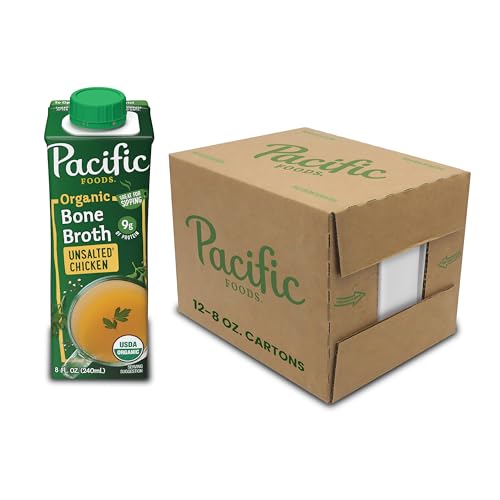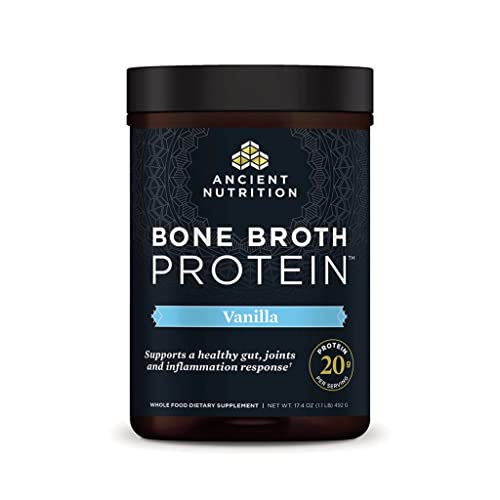
Pacific Foods Bone Broth
| Pros | Cons |
|---|---|
|
|
Our content is meticulously curated through independent research, testing, reviews, and AI-driven recommendations, all designed to present you with the finest product choices. When you make a purchase through our links, it could result in us earning a commission.

Bone broth is a broth made from boiling animal bones and connective tissue. It is simmered for much longer than traditional broths, which results in a powerful and rich flavor profile. Bone broth is also packed with nutrients and minerals like collagen, calcium, magnesium, and amino acids. The use of bone broth has skyrocketed in popularity over the years due to its potential health benefits, such as improving joint health, supporting digestion, and boosting the immune system.
We reviewed a ton of the best bone broths and narrowed down our favorites (in both liquid and powder form). The best overall spot goes to the Kettle & Fire Mushroom Chicken Bone Broth because of its clean ingredient list, versatility, and high protein content.
.
Bone broth can be used in many different ways, from cooking meals to providing nutrients. Here’s everything you need to know about this wondrous liquid.
Bone broth refers to a mixture of bones that are simmered in water for long periods of time. Bone broth has many different uses, and while it’s sometimes used for cooking, it also sees plenty of use in the dietary scene, with many people consuming bone broth directly for their daily dose of protein.
The terms “bone broth” and “stock” are often used interchangeably, and while they are very similar to one another, there are a few differences. Stock refers to a mixture of water, bones, and various vegetables, all simmering for long periods of time. Bone broth can be made either with just bones or alongside vegetables, depending on how it’s produced. In general, when using the term “stock”, it’s usually referring to the context of cooking. On the other hand “bone broth” is a term more commonly used in dietary supplements. However, since the two are almost the same thing, there’s really no problem with confusing one for the other.
At first glance, the stock looks like a base for recipes such as stews and soups. But they’re actually more commonly used than you think. In fact, chicken stock, a very common form of stock, is used in recipes ranging from salads to pasta to casserole and much, much more. The reason behind this diversity is that broth isn’t just used the same way all the time. Sure, it may be added to a soup sometimes, but it can also be used to cook certain vegetables, add flavor to particular ingredients, and so on. Cooking is a very complex hobby and profession, and the stock has been at the forefront of many recipes for decades, if not centuries.
It’s common knowledge that protein is found in meat, but did you know that bones also have a ton of protein in them? However, the protein in bones goes by a different name - collagen. Collagen is what makes up our bones, and it falls under the macronutrient category of proteins. This type of protein is a great addition to your diet, and it’s for this reason that bone broths have become so popular as a dietary supplement. What better way to get a healthy dose of collagen than through a simmered mixture of bones?
If you’d rather not make broth yourself, the closest you can get to authentic broth is through ready-made stock. You can find these products in most grocery stores. The broth is already prepared, with the bones and vegetables removed from the stock, leaving only the liquid behind. Because they come in such large quantities (often in big cartons), this type of bone broth product is most commonly used for cooking. As they’re not made for dietary consumption, you may not like the taste if you drink them directly.
The second category of bone broth products is an instant mix. Instant mixes are more space-efficient than ready-made stock, as you can easily store them in smaller compartments before turning them into the broth. Instant stock or broth is available either in cube or powder form, and there are a few differences between the two. Broth cubes are made specifically for cooking, and they slowly but steadily introduce the ingredients of the broth into the water. Broth cubes are also very easy to use, and since they’re not powder-based, you can’t spill them by accident. Powder, on the other hand, is a lot more dissolvable, and it’s mostly used for dietary bone broth drinks. The powder can sometimes be packed into individual sachets. The user can then open a single sachet every time they need a drink, regulating the amount of broth that they drink per serving.
Finally, we have dietary powder. These powders are made primarily for dietary purposes, and while it is possible to use them in cooking, they’re often too expensive to be worth considering as an alternative to ready-made or instant stock. The dietary powder has the benefit of being mixed with various other ingredients, allowing you to gain more benefits than just the usual collagen and amino acids found in bone broth. Dietary powders involving bone broth can either be general dietary powders or protein powders. General dietary powders have a little bit of everything, and they’re more suited for specific diets as they give you good doses of all the essentials. On the other hand, protein powders are more useful for muscle gains and the like. If you’re working out or just looking to improve your daily intake of protein, then you’ve got that option instead.

| Pros | Cons |
|---|---|
|
|

| Pros | Cons |
|---|---|
|
|

| Pros | Cons |
|---|---|
|
|

| Pros | Cons |
|---|---|
|
|

| Pros | Cons |
|---|---|
|
|

| Pros | Cons |
|---|---|
|
|

| Pros | Cons |
|---|---|
|
|